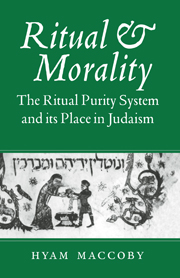Book contents
- Frontmatter
- Contents
- Preface
- Acknowledgments
- List of abbreviations
- 1 The sources of impurity: the human corpse
- 2 The corpse in the tent: an excursus
- 3 The sources of impurity: menstruation
- 4 The sources of impurity: childbirth: the zabah and zab
- 5 Normal emission of semen
- 6 Animals and purity
- 7 Impurity and sacrifices
- 8 The Red Cow: the paradoxes
- 9 The Red Cow and niddah
- 10 Leprosy
- 11 The purification of the leper
- 12 Corpse and leper: an excursus
- 13 Ritual purity in the New Testament
- 14 Milgrom on purity in the Bible
- 15 From demons to ethics
- 16 Ritual purity and morality
- Appendix A The haberim
- Appendix B The rabbinic system of grades of impurity
- References
- Index of quotations
- General index
5 - Normal emission of semen
Published online by Cambridge University Press: 24 November 2009
- Frontmatter
- Contents
- Preface
- Acknowledgments
- List of abbreviations
- 1 The sources of impurity: the human corpse
- 2 The corpse in the tent: an excursus
- 3 The sources of impurity: menstruation
- 4 The sources of impurity: childbirth: the zabah and zab
- 5 Normal emission of semen
- 6 Animals and purity
- 7 Impurity and sacrifices
- 8 The Red Cow: the paradoxes
- 9 The Red Cow and niddah
- 10 Leprosy
- 11 The purification of the leper
- 12 Corpse and leper: an excursus
- 13 Ritual purity in the New Testament
- 14 Milgrom on purity in the Bible
- 15 From demons to ethics
- 16 Ritual purity and morality
- Appendix A The haberim
- Appendix B The rabbinic system of grades of impurity
- References
- Index of quotations
- General index
Summary
While the zab's emissions are abnormal and pathological, even normal emission of semen causes uncleanness, but of a lesser kind (Lev. 15:16–18). Whether this emission is involuntary (known in rabbinic literature as qeri, i.e. accidental), or voluntary (in sexual intercourse), it causes the man a one-day uncleanness. He must immerse himself in the ritual pool, and await evening for full purification. In this case, Scripture does not prescribe a washing of clothes, and the rabbis take this to be the norm in cases of one-day uncleanness, the more serious genital dischargers being an exception. Further, any person or vessel that touches the man who has had an emission of semen remains pure. Food, whether solid or liquid, holy or profane, does become unclean if touched by him. While he is awaiting final purification (between his immersion and the evening) he can pollute only holy food, and causes no impurity to ordinary food by his touch. In this condition (known as tebul yom), he must avoid touching holy food, but may touch or eat ordinary food even if he is a member of a purity society (haber), sworn to eat even ordinary food ‘in purity’ (see Appendix A).
On the other hand, semen itself is a more serious source of impurity, being what the rabbis call a Father of Uncleanness (see Appendix B). Any person or vessel that comes in contact with semen incurs a one-day uncleanness. This is true also of all the products of genital discharges. In the case of the more serious genital dischargers, even their normal liquid discharges (spit and urine) are polluting (see below), but not in the case of the ba'alqeri.
- Type
- Chapter
- Information
- Ritual and MoralityThe Ritual Purity System and its Place in Judaism, pp. 58 - 66Publisher: Cambridge University PressPrint publication year: 1999

